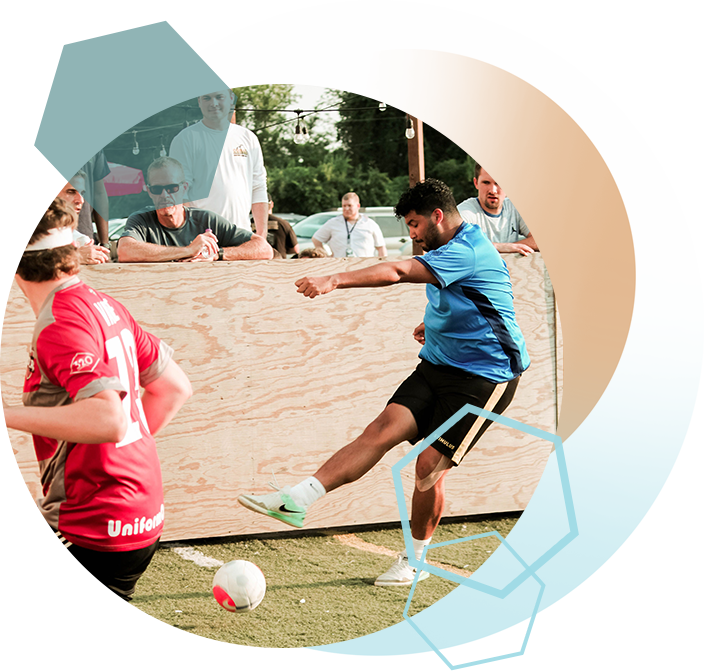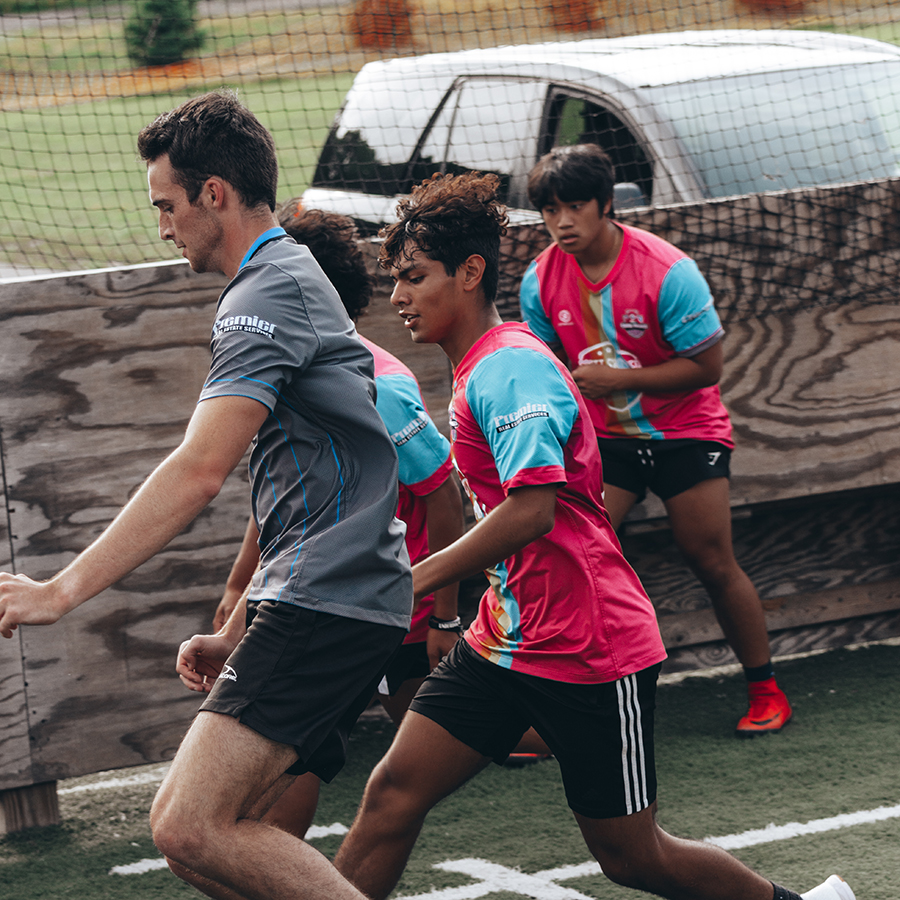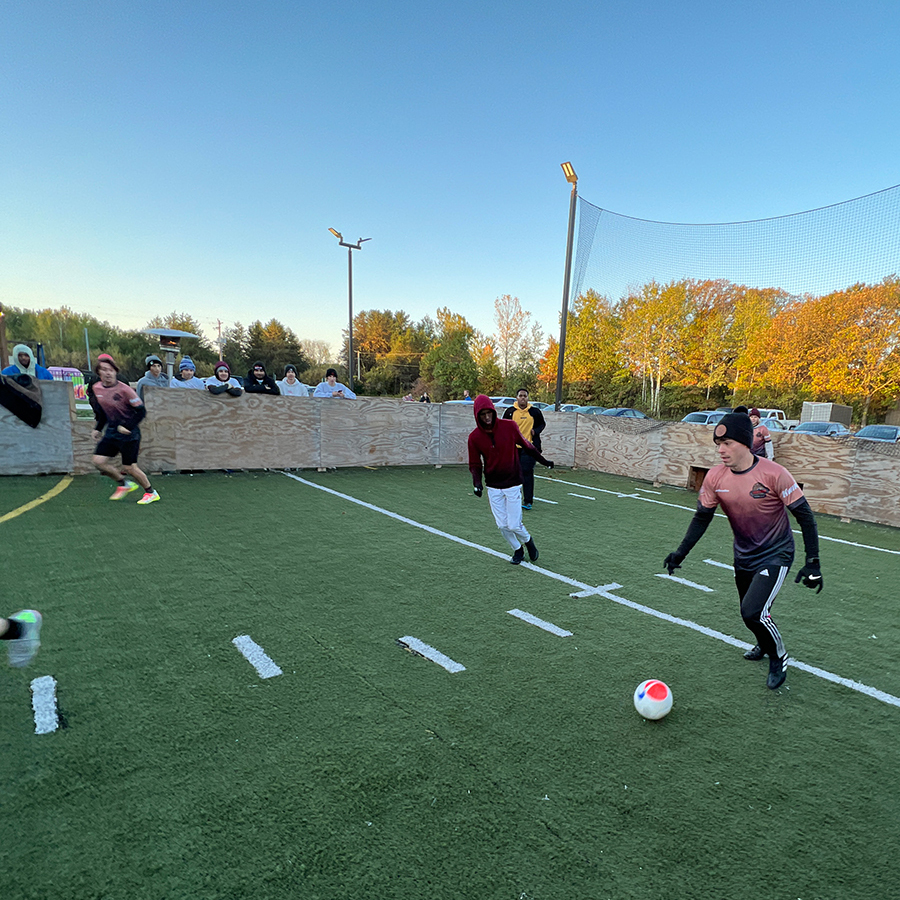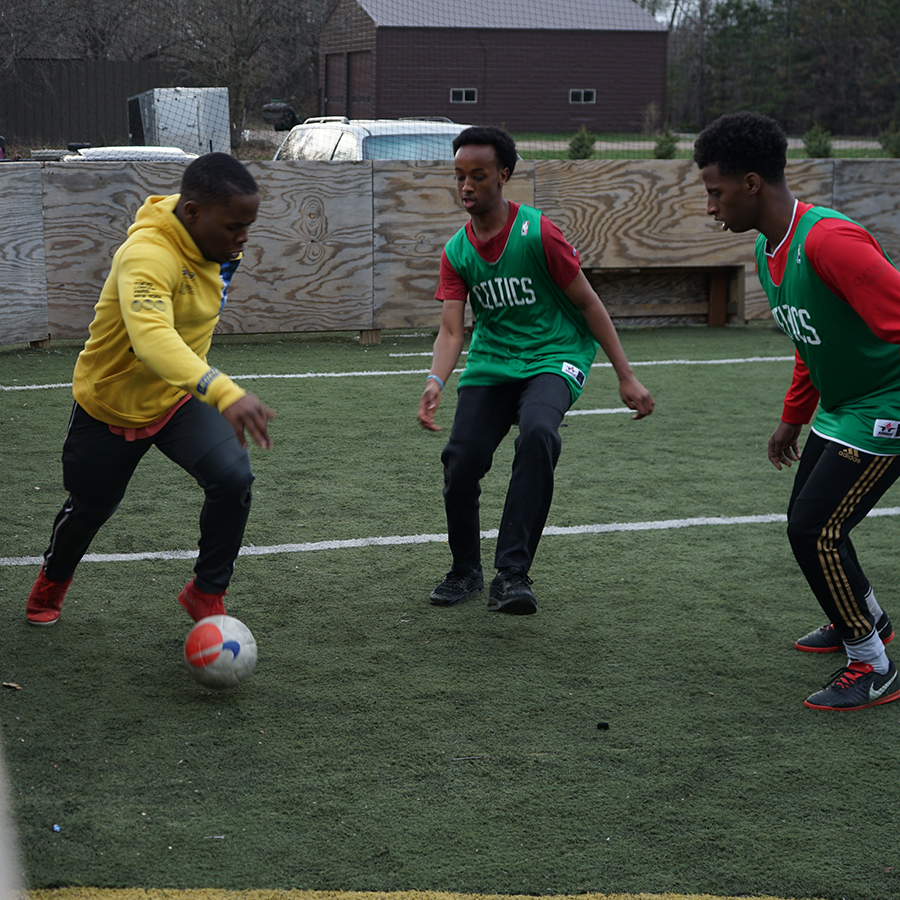Ball In and Out of Play
The ball is out of play when:
It has completely crossed the goal line or touchline whether on the ground or in the air.
The official sounds his/her whistle.
The ball is in play at all other times, including when:
The ball rebounds off the boards in the field of play.
There will be no whistle to restart play except:
When a team asks the official for 5 yards
When a play has been stopped to caution or eject a player.
For a penalty kick
When a goal is scored, the ball is out of play when it touches the blue building wall or net. The restart will be an indirect kick for the opponent from their goalie.
Out of Play Restarts
Restarts shall be classified under two types:
Penalty Kicks – Awarded for any infringement of the rules, within the penalty area, that stops a clear goal or obvious scoring opportunity.
Indirect Goal Kicks – from which a goal cannot be scored unless the ball has been touched by a player other than the kicker before passing into the goal. Indirect kicks will result in the opposing team’s goalie starting with the ball.
Offenses for which a DIRECT kick shall be given are:
Kicking or attempting to kick an opponent.
Tripping or attempting to trip an opponent.
Slide Tackling
Intentionally handling, carrying, striking, or propelling the ball with a hand or arm.
Offenses for which an INDIRECT free kick shall be given are:
Obstructing the progress of an opponent
Playing in a dangerous manner (i.e. high kick, playing on the ground)
Any overly physical play as deemed a foul by the referee
Fouls and Misconduct-Disciplinary Sanctions
Warnings (administered when the referee deems play is becoming dangerous and bordering a carded foul):
Use of profanity
Grabbing or hindering a players progress
Anything the referee deems needed as to keep the game safe and fun
Yellow card offenses (substitution for the offender must be made, the offender must sit off the rest of the half. Sub can fill in or team can play a man down):
Unsportsmanlike behavior
Repeated or excessive profanity
Dissent by word or action
Boarding
A slide tackle that takes out a player
Persistent infringement of the rules of the game
Delaying the restart of play
Failing to respect the required distance when play is restarted with a goal kick or free kick
Entering the field of play without the Official’s permission
Four Yellow Cards will result in a one game suspension, each subsequent yellow will result in another game suspension
Yellow Cards can be given based on the referee’s discretion
Red card offenses (substitutions may not be made, team with the foul will forfeit the game. If a red card is assessed to both teams, both shall forfeit and receive losses for the night):
Serious foul play
Violent conduct
Spitting on opponent or any other person
Denies the opposing team a goal or an obvious goal scoring opportunity by deliberately handling the ball
Denies an obvious goal scoring opportunity to an opponent moving towards the goal by an offense punishable by a free kick or penalty kick
A slide tackle where the intent was to injure a player (ref’s discretion)
Using offensive, insulting, or abusive language and/or gestures
Receiving a second yellow card caution in the same match
Red Cards can be given based on the referee’s discretion.
Officials
An official shall enforce the rules and decide any disputed point. The official has the responsibility and authority of calling fouls.
The official may stop the game for any rule infringement, and suspend or terminate the game whenever stoppage is deemed necessary.
The official shall allow play to continue when the team against which an offense has been committed will benefit from such an advantage.
The official may caution any player guilty of misconduct or unsportsmanlike conduct, and if the player persists, eject him/her from the game. An ejected player may not be replaced!
Only the designated captain, in a sportsmanlike manner, may approach the official and question a call.
Slide tackles
Slide tackles are considered dangerous play and will result in a foul.
Advantage can be given if the ref deems the play still as a scoring threat.
As soon as the whistle blows or the attack dissolves, the end result is a penalty kick.
Slide tackles can range from a standard foul to a red card depending on the seriousness of the play. It is the ref’s discretion.
Goalie play
Goalies cannot use their hands under any circumstance
They can have three points of contact on the ground (example - 2 feet and their knee).
If the goalie uses more than three points of contact on a dangerous scoring opportunity (lays on the ground, dives across), it shall result in a penalty.
If it stops an obvious scoring opportunity, it shall be ruled a goal.
If it’s a questionable scoring opportunity, it will be a goal kick or a penalty kick - as deemed by the referee.



